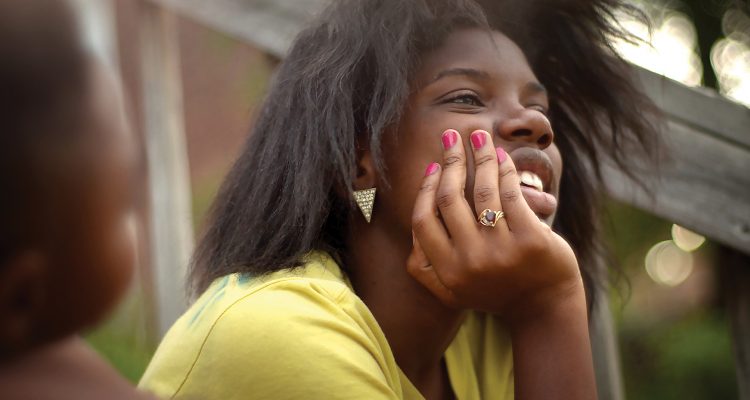A coming of age documentary told against the fiery backdrop of teenager Mike Brown’s tragic death and the Ferguson, Missouri riots and protests that followed in 2014, the documentary “For Ahkeem” is a sobering piece of work. One of the most startling and lingering sequences begins when the film’s subject Daje Shelton and her mother sit shell-shocked watching television as protests erupt in Ferguson following the grand jury ruling on the police officers that killed an unarmed teenage boy.
READ MORE: The 100 Most Anticipated Films Of 2017
As visceral, shocking images unfold, the camera cuts to Shelton and back to the small infant in her lap, the titular Ahkeem. Focusing on what happens when you’re brought up in a world unwilling to protect you, Jeremy S. Levin and Landon Van Soest’s powerful documentary drives these ideas home with quiet devastation. Following Shelton through her expulsion from high school up through a last chance to graduate by attending a court-supervised alternative school program “For Ahkeem” charts a two-year struggle of ups and downs. Daje fights for teenage normalcy, good grades and falling for boys, but must navigate the fraught relationship with her mother and the social roadblocks in front of her.
Despite all the sociopolitical texture and darkness that surrounds the death of Brown, “For Ahkeem” never allows the viewer to forget that this story about a young woman working against negative expectations is unfortunately all too common. As one teacher passionately states, “You know what bothers me? Black kids in Missouri get expelled more than any other kids in America.” This mentor attempts to keep his students out of potentially damaging school institutions by engaging them, but it’s a sentiment that is easier preached than practiced.
 An air of sadness keeps the pulse of the documentary in motion, especially when shocking details are revealed so casually. There’s a moment where Shelton is talking about an acquaintance she knew who was shot, only to then offhandedly reveal she was shot too, lifting her shirt to show a scar on her abdomen. She and plenty of other kids in the documentary grapple with fears that teenagers should never have to face: will they be the next victim of a long line of violent acts? “He was 16. They’re all 16,” one of the teens solemnly whisper.
An air of sadness keeps the pulse of the documentary in motion, especially when shocking details are revealed so casually. There’s a moment where Shelton is talking about an acquaintance she knew who was shot, only to then offhandedly reveal she was shot too, lifting her shirt to show a scar on her abdomen. She and plenty of other kids in the documentary grapple with fears that teenagers should never have to face: will they be the next victim of a long line of violent acts? “He was 16. They’re all 16,” one of the teens solemnly whisper.
READ MORE: ‘Gilbert’ Gottfried Doc Does Justice To A Comedy Legend [Tribeca Review]
However grim at times, hope does exist as the documentary floats in and out the Shelton family’s life. But it’s a hard road they face. Challenge after challenge arise, the most difficult being when Daje learns she’s pregnant and decides to keep the baby. Ahkeem is the throughline of the story, and some of the most heartbreaking moments depict Daje softly speaking to her son as she continues to fight for a better life. Because while “For Ahkeem” rarely needs to spell it out, its implicitly stated that the deck is statistically stacked against her.
Despite the uplifting tone the documentary ends on, there’s an unfortunately open ended nature to some of the scenes that frustrate, but the film runs just lean enough to never truly lose any narrative steam. Nicholas Weissman does beautiful work as cinematographer, creating a distinct contrast between the depressing school scenes and the joy that arrives through friends, giving the film a captivating and cinematic edge.
A stark look at institutionalized racism and a system actively working against you, “For Ahkeem,” uses the personal — a young woman’s success and coming into her own— to complete a bigger, often somber picture. Not only an absorbing documentary but an important one especially at times when prejudice feels like it runs at an all time high, “For Ahkeem” tells an intimate and touching story about one girl’s plight, but it also serves to remind that her difficult journey is just one amongst many. [B+]
Follow along with all our coverage of the 2017 Tribeca Film Festival.

